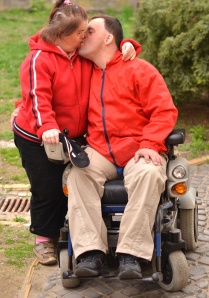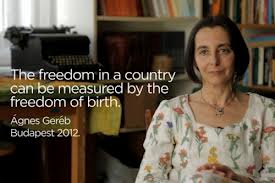Sexuality: Now
Sexuality: Now Overview
Examples of Vulnerability in People’s Stories
References
One of the most important advances in the history disability rights in Canada occurred with the 1986 court case known as “E. (Mrs.) v. Eve” (Eve’s Law), which involved a mother seeking legal consent to have her daughter sterilized without the daughter’s permission. Eve, an intellectually disabled woman with speech difficulties, had been developing a close relationship with a fellow client at her day program. Her mother feared that she could become pregnant and attempted to have her sterilized. The case went as far as the Supreme Court of Canada, and the landmark decision codified disabled people’s rights to autonomy over their own bodies.
 While Eve’s Law was an important victory for disability and sexuality rights, there are still circumstances that allow for bypassing those rights. For many people, the idea of sexual rights for disabled people, particularly intellectually or profoundly physically disabled people, is seen as either a non-issue or a problem to be contained. As mentioned elsewhere, discomfort about disability and sexuality stem from infantilism and protectionism. In turn, these attitudes can lead parents, guardians and workers to actions that are unhelpful and even unethical.
While Eve’s Law was an important victory for disability and sexuality rights, there are still circumstances that allow for bypassing those rights. For many people, the idea of sexual rights for disabled people, particularly intellectually or profoundly physically disabled people, is seen as either a non-issue or a problem to be contained. As mentioned elsewhere, discomfort about disability and sexuality stem from infantilism and protectionism. In turn, these attitudes can lead parents, guardians and workers to actions that are unhelpful and even unethical.
Beginning with information and education about sex and sexuality, in our project we have repeatedly heard about intellectually disabled children who, although ‘included’ in school, have automatically been removed from Sex Education classes. This seems to be based on the assumption that the information would not be appropriate or relevant for disabled children. Further, mainstream sex education does not typically include information about disability and sex, nor is it provided in accessible formats (for inclusive models, see Resources). Thus, from very early on, disability and sexuality are conveyed as incompatible to disabled and non-disabled children alike.
The right to physical control over one’s body is not always guaranteed despite Eve’s Law. In our research, we have been told by workers about parents or guardians who have been able to have hysterectomies performed on disabled girls and women under the guise of ‘compassion’, because menstruation would be ‘too painful’ or too difficult to manage. In an echo of earlier eugenic sterilization, some of these women were not adequately informed about the surgeries. Likewise, workers and intellectually disabled women have described the surprisingly routine use of long-term contraceptives such as Depo-Provera or continuous birth control pills, often administered under coercive circumstances or without the individual’s consent. Outside of this project, there is evidence that young men with intellectual disabilities have been medically castrated through sex-suppressing drugs, rather than finding social ways to shape and satisfy their sexual expression [1].
Outside of Canada, in an extreme example of lack of control over one’s body, ‘Ashley X’, an intellectually disabled 6-year old girl had her uterus, ovaries and breasts removed and was given hormone therapy to keep her as a perpetual child, to facilitate her care and reduce potential discomfort should she menstruate. In this case, the parents’ desires for ease of treatment overrode the child’s right to bodily integrity [2]. Some bioethicists point out that the ‘Ashley treatment’ positions carers’ rights over the rights of the individual, and is based on assumptions about intellectually disabled people as perpetual children without rights or expectations.
 In the Eugenics to Newgenics project, we have heard numerous stories of control over disabled people’s sexuality, for example, where expressions of sexual desire such as masturbating or rubbing by disabled clients is seen as an ‘inappropriate behaviour’ that needs to be controlled or erased. In one instance, a woman who had been seen rubbing herself sexually during her day program was taken out of the program each day, placed inside a ‘private’ room and told to masturbate. In this case, her sexual desire was not responded to as a sign of boredom or as something that should be perhaps channeled into more satisfying relational opportunities, but was instead regulated and stigmatized in a very public way. In another instance, we learned of a young man who was locked out of his ‘home’ because his ‘supportive living’ worker did not agree with his use of pornography. It is important to note that issues of control and stigmatization are compounded for disabled people if they are gay, lesbian or bisexual [3, 4] because of some workers’, parents’ and guardian’s own values about sexuality.
In the Eugenics to Newgenics project, we have heard numerous stories of control over disabled people’s sexuality, for example, where expressions of sexual desire such as masturbating or rubbing by disabled clients is seen as an ‘inappropriate behaviour’ that needs to be controlled or erased. In one instance, a woman who had been seen rubbing herself sexually during her day program was taken out of the program each day, placed inside a ‘private’ room and told to masturbate. In this case, her sexual desire was not responded to as a sign of boredom or as something that should be perhaps channeled into more satisfying relational opportunities, but was instead regulated and stigmatized in a very public way. In another instance, we learned of a young man who was locked out of his ‘home’ because his ‘supportive living’ worker did not agree with his use of pornography. It is important to note that issues of control and stigmatization are compounded for disabled people if they are gay, lesbian or bisexual [3, 4] because of some workers’, parents’ and guardian’s own values about sexuality.
 Clearly, the values of those who ‘support’ disabled people can play a strong – and often problematic – role in the sexual expression and practice of disabled people [5]. It is thus important to bring conversations about sexuality, rights, and disability forward.
Clearly, the values of those who ‘support’ disabled people can play a strong – and often problematic – role in the sexual expression and practice of disabled people [5]. It is thus important to bring conversations about sexuality, rights, and disability forward.
Examples of Vulnerability in People’s Stories
Brianne Strauss
Brianne is a 52-year-old woman who was born with multiple congenital defects, and has used a wheelchair for many years. Brianne’s story illustrates the sexual dissatisfaction experienced by many people with disabilities. Brianne longed to have a boyfriend in high school, but unfortunately none of her crushes took any interest in her. Because of this, Brianne ended up feeling sexually frustrated. Her father became aware of this after a masseuse told him that Brianne had gotten a little too excited during their session. However, rather than react by giving her the confidence and information needed to explore her sexuality, he took her to a sex store and bought her toys to use in private. He feared that if Brianne were allowed to express her sexuality with other people, she might do something ‘inappropriate,’ which she interpreted to mean having a child.
Brianne’s sexuality was limited to masturbation until she met her first sexual partner through a phone sex line when she was 35. She invited him to her house, and they had sex. She remembers the encounter as scary and upsetting. He seems to have given no thought to her pleasure, and left immediately after ejaculating on her, saying that he was going to buy some chips, but never came back. It is clear that he used Brianne for sex, as did a number of other men whom she met through phone sex. Some exploited her vulnerability by refusing to wear condoms, and others forced her to have sex even though she did not want to. Brianne explains why she felt that she could not refuse these men:
Brianne: Sometimes you worry ‘cause you don’t know what they’ll do if you say “no” or…
Interviewer: Oh, okay. So it didn’t always feel like it was a free choice for you?
Brianne: Yeah, yeah.
Interviewer: Okay so if a guy was on the phone with you and he said “I wanna come over”, was that the same feeling you had? Like I better say “yes” in case I don’t get to talk to him again?
Brianne: Yeah. [Laughs]
Brianne was vulnerable largely because she was lonely and lacked information about her sexual rights, and how to form relationships. The irony is that in trying to protect Brianne, her support network left her with few tools to negotiate safe relationships.
Today Brianne still feels sexually unfulfilled, mainly because she lives in a care system which closely surveils and controls her sexuality. For example, she does not look up porn because she knows it would appear in her browser history. She explains why this would be distressing by sharing one of her experiences:
Brianne: Yeah, and I accidentally – I was doing YouTube and I accidentally punched in YouTube something dot com and this porn and [laughs] it’s funny. It’s still in my computer.
Interviewer: Do you worry about privacy in that way?
Brianne: Yeah, like some people say I like that I don’t – they joke around that I’m watching porn. [Laughs]
Likewise, a lack of privacy is the main reason why she feels cannot use sex toys. As she explains:
Brianne: I have vibrators and that. But I never use them anymore ‘cause I’m afraid to use them here.
Interviewer: Why?
Brianne: Because I’m afraid I’ll make too much noise.
The struggles Brianne faces are typical of people with disabilities burdened by protectionism. Her sexuality is treated as something to keep secret, and she has not been given information about sex for fear that she might meet a man and get pregnant. However, such protective measures have contributed much to Brianne’s vulnerability, and have denied her a satisfying sexual life for many years.
Ellen Holmes
Ellen’s story shows the exploitation often experienced by people with disabilities in sexual relationships. Ellen is a 25-year-old woman who has minor Cerebral Palsy, causing her to walk with knee and hip contractions. At the time of the interview she was hard at work completing her Master’s degree.
Ellen is entirely capable of sex physically, but disablism complicates her access to sexual intimacy. As Ellen explains, her sexuality has not been celebrated because many people do not think that disabilities can be sexy:
Ellen: It eventually sunk in that um, hey my body is not thought of in the same way as other people’s bodies. Um, and most people think of it as unattractive or asexual or insert most negative descriptors –
Interviewer: Or childlike.
Ellen: Yeah, or that…And I’ve never received any support or education about that.
Ellen has continuously absorbed body-negative messages throughout her life. These disablist messages, coupled with sexism, produced a complex message for Ellen, as described in her account of being cat-called:
Ellen: One of the first times that like I was cat called, I still remember…This group of guys was like hollering at me. I was like what are you – what’s going on, I didn’t understand. And um, I was actually thought – like I was confused because I thought they might have been heckling me for the way I walked but it was actually positive. And it was mixed feelings. Like it made me feel kind of objectified and disgusting. Someone’s reinforcing you positively, how are you supposed to deal with all that emotion, so, I don’t know.
Ellen’s experience demonstrates the double-bind some women with disabilities find themselves in. They are either desexualised as a person with disabilities, or objectified as a woman. Neither helps to establish their confidence.
Ellen’s lack of confidence also contributes to her relationship troubles. For example, while in university she met a dashing but conniving Ph.D student, who manipulated her into having unprotected sex with him at the same time he was sexually active with other women. He urged her to keep their relationship a secret, and it was four months before Ellen finally broke up with him. Ellen’s description of the break-up shows how little he respected her:
Ellen: The last time I saw him, like – this is gonna be vivid, but like we were naked and he was on top of me and he was like on his cell phone, figuring out his plans for the evening. And here I am, like –
Interviewer: Lying under –
Ellen: Lying underneath you. [Laughs] And being like “hey, buddy.” So that’s why I started out and left and, that was the last time I had seen him. And um, that was like one of the most anxiety provoking experiences of my life.
After ending her relationship with the Ph.D student, Ellen met her current boyfriend of 1½ years. She initially did not want to pursue a relationship with him because she felt physically exhausted and weak at the time, but he was persistent. They ended up together, but he has had difficulty accepting Ellen’s increasing independence that has resulted from some recent health improvements:
Interviewer: So as you’re moving forward into independence like is that causing some friction?
Ellen: Yeah. I’ve had to tell him a couple times like, you don’t need to speak with me as though I’m a child. I’m not a child…I’ve had to tell him like many times, not many times, several times, that he doesn’t’ have to tell me what to do in – something as small as telling me how to cut a watermelon.
From her descriptions, Ellen’s boyfriend consistently infantilises her, giving unsolicited advice and treating her as though she is incompetent. Ellen has confronted him about this, but he seems slow in adjusting. Even so, Ellen considers him her first real love.
Women with disabilities frequently experience unpleasant or abusive relationships with men. The confidence and self-worth they need to break off such toxic relationships is often not supplied to them by their supports. In Ellen’s case, the low self-esteem and poor body image which disablism created in her, and which her support network did little to combat, has left her vulnerable to manipulative and unsatisfactory relationships.
- Carlson, G., M. Taylor, and J. Wilson, Sterilisation, Drugs Which Suppress Sexual Drive, And Young Men Who Have Intellectual Disability. Journal of Intellectual & Developmental Disability, 2000. 25(2): p. 91-102.
- Hamilton, C., Bodies That Matter: gender, rights, profound intellectually disability and the case of Ashley X. Disability and Society, 2013: p. 1-46.
- Abbott, D. and J. Burns, What’s Love Got to Do With It?: Experiences of Lesbian, Gay, and Bisexual People with Intellectual Disabilities in the United Kingdom and Views of the Staff Who Support Them. Sexuality Research and Social Policy, 2007. 4(1): p. 27-39.
- Abbott, D. and J. Howarth, Still Off-Limits? Staff Views on Supporting Gay, Lesbian and Bisexual People with Intellectual Disabilities to Develop Sexual and Intimate Relationships? Journal of Applied Research in Intellectual Disabilities, 2007. 20(2): p. 116-126.
- Hamilton, C., Doing the Wild Thing: Supporting an Ordinary Sexual Life for People with Intellectual Disabilities. Disability Studies Quarterly, 2002. 22(4): p. 40-59.
